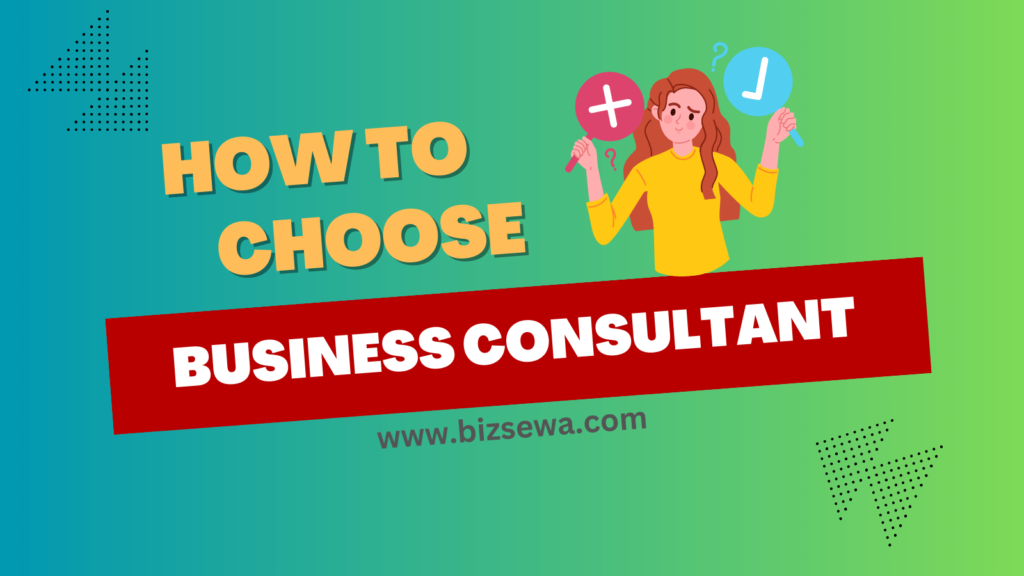How to Choose the Right Business Consultant for Your Company

As a business owner, you may have heard the term “business consultant” thrown around, but what exactly does that mean? In short, a business consultant is an expert who provides advice and guidance to companies looking to improve their operations, grow their business, or address specific challenges. Hiring a consultant can be a wise investment for your company, as they bring a fresh perspective, specialized knowledge, and objective analysis to your business.
However, not all business consultants are created equal, and it’s essential to choose the right consultant for your company’s needs. This article will provide an overview of the key considerations when selecting a business consultant, from evaluating their credentials and track record to ensuring a good fit with your team and company culture. By following these guidelines, you can maximize the benefits of working with a consultant and take your business to the next level.
Understanding Your Needs
Before you can decide a business consultant, it’s crucial to understand your company’s specific needs and objectives. Start by identifying your company’s goals and determining where you need help to achieve them. Do you need help with financial planning? Are you struggling with marketing and sales? Are you looking to streamline your operations and improve efficiency?
Once you’ve pinpointed the areas where you require support, you can start creating a list of potential consultants who specialize in those areas. You can ask for referrals from other business owners or industry contacts, search online for consultants in your area, or consult with professional organizations or associations. As you gather names, be sure to research each consultant’s qualifications and experience to ensure they have the expertise you need.
Evaluating Potential Consultants
Once you have a list of potential consultants, it’s time to evaluate them to determine who is the best fit for your company. Here are some key factors to consider:
- Credentials and experience: Check the consultant’s credentials and ensure they have the necessary training and education to provide the services you require. Look for certifications or relevant degrees, as well as experience working with companies like yours.
- Track record: Review the consultant’s track record to ensure they have a history of successful engagements. Ask for references and follow up with past clients to learn about their experience working with the consultant.
- Communication and interpersonal skills: Examining the consultant’s communication and interpersonal skills is crucial to ensure that they can work effectively with your team. Look for consultants who are good listeners, clear communicators, and able to build rapport quickly.
- Availability and flexibility: Consider the consultant’s availability and flexibility when evaluating them. Do they have other clients? How quickly can they start working with your company? Will they be able to accommodate your schedule and needs?
By carefully evaluating potential consultants based on these factors, you can narrow down your list and choose the consultant who is the best fit for your company.
Negotiating the Contract
Once you’ve identified a consultant who meets your needs, it’s time to negotiate the terms of the contract. Here are some key factors to consider:
- Fees and expenses: Discuss the consultant’s fees and any additional expenses, such as travel or materials. Clarify how and when payments will be made.
- Scope of work and timeline: Determine the specific tasks the consultant will perform and the expected timeline for completion. Be clear about any deliverables, milestones, or deadlines.
- Role and responsibilities: Clarify the consultant’s role and responsibilities, as well as your company’s expectations. Ensure there is a clear understanding of who will be responsible for what tasks and decisions.
- Communication and reporting protocols: Establish clear communication and reporting protocols to ensure you stay informed about the consultant’s progress. Determine how often you will meet or communicate, and how you will track progress and address any issues that arise.
Negotiating these factors can help ensure a successful engagement and avoid misunderstandings or conflicts down the line. Make sure to get everything in writing and have both parties sign the contract before the work begins.
Managing the Relationship
Once you’ve hired a business consultant, it’s important to manage the relationship effectively to maximize the benefits of the engagement. Here are some key strategies for managing the relationship:
- Setting expectations: Establish clear expectations for communication and progress updates. Determine how typically you will meet or communicate and what information you need to receive.
- Maintaining communication: Maintain open and honest communication with the consultant throughout the engagement. Share your feedback and concerns, and encourage the consultant to do the same.
- Providing feedback: Provide feedback on the consultant’s work and address any concerns promptly. This can help the consultant adjust their approach and ensure the engagement stays on track.
- Staying involved: Stay involved in the consulting process and remain informed about the work the consultant is doing. This can help ensure the consultant stays aligned with your company’s goals and objectives.
By managing the relationship effectively, you can help ensure a successful engagement and achieve the desired outcomes.
Maximizing the Benefits
To maximize the benefits of working with a business consultant, it’s important to take a proactive approach to incorporating their expertise into your company’s operations. Here are some key strategies for maximizing the benefits of the engagement:
- Leveraging expertise: Take advantage of the consultant’s expertise and experience by asking for their advice on specific issues or projects. Use their insights to develop new strategies or improve existing ones.
- Incorporating recommendations: Incorporate the consultant’s recommendations into your company’s operations, processes, and culture. Make sure to communicate these changes to your team and provide any necessary training or support.
- Measuring impact: Measure the impact of the consultant’s work by establishing clear goals and metrics to track progress. Evaluate the results of the engagement and use this information to identify areas for further improvement.
- Building a long-term relationship: Consider building a long-term relationship with the consultant to continue to leverage their expertise and experience. This can help ensure a more sustainable and effective approach to addressing your company’s ongoing needs.
By taking these steps, you can help ensure that the engagement with your business consultant has a lasting impact on your company’s success.
Conclusion
In conclusion, selecting the right business consultant can have a significant impact on your company’s success. By taking the time to understand your needs, evaluating potential consultants, negotiating the contract, managing the relationship effectively, and maximizing the benefits of the engagement, you can help ensure a successful outcome. Here are some key takeaways from this article:
- Understanding your needs is crucial to selecting the right consultant.
- Evaluating potential consultants requires careful consideration of their credentials, track record, communication skills, and availability.
- Negotiating the contract involves discussing fees, determining the scope of work, clarifying roles and responsibilities, and establishing communication protocols.
- Managing the relationship involves setting expectations, maintaining communication, providing feedback, and staying involved in the consulting process.
- Maximizing the benefits of the engagement involves leveraging the consultant’s expertise, incorporating their recommendations, measuring impact, and building a long-term relationship.
Selecting the right business consultant can be a challenging process, but it can also be highly rewarding. By working with the right consultant, you can gain valuable insights and support to help your company achieve its goals and objectives. Remember to stay involved in the process, communicate openly and honestly, and take a proactive approach to incorporating the consultant’s recommendations into your company’s operations.
We hope this article has provided you with the information and tools you need to choose the right business consultant for your company and maximize the benefits of the engagement.
Some FAQs related to selecting and working with a business consultant
What qualifications should I look for in a business consultant?
When selecting a business consultant, it’s important to look for someone with relevant experience, strong communication skills, and a track record of success in your industry or area of need. Look for someone with relevant certifications, training, or degrees in business, consulting, or a related field.
How long does a consulting engagement typically last?
The length of a consulting engagement can vary depending on the scope of work and the needs of the company. Some engagements may last just a few weeks, while others may span several months or even years.
How much should I expect to pay for a business consultant?
Consulting fees can vary widely depending on the consultant’s experience, expertise, and location. Hourly rates may range from a few hundred to several thousand dollars per hour, while project-based fees may range from a few thousand to hundreds of thousands of dollars.
What are some warning signs that a consultant may not be a good fit?
Warning signs that a consultant may not be a good fit for your company include poor communication skills, a lack of experience or expertise in your industry or area of need, an inability to provide clear recommendations or solutions, and a lack of professionalism or transparency.
How involved should I be in the consulting process?
It’s important to strike a balance between staying involved in the consulting process and giving the consultant the space they need to do their work effectively. Make sure to establish clear communication protocols and expectations upfront, and check in regularly to provide feedback and monitor progress.
Can a consultant help my company with long-term planning?
Yes, many business consultants can help companies with long-term planning by providing strategic advice, market research, and other insights to inform decision-making.
How can I measure the success of a consulting engagement?
The success of a consulting engagement can be measured using a variety of metrics, including improvements in revenue, profitability, productivity, customer satisfaction, or other key performance indicators (KPIs).
What should I do if I’m not satisfied with a consultant’s work?
If you’re not satisfied with a consultant’s work, it’s important to address your concerns directly and provide specific feedback on what needs to be improved. Consider renegotiating the contract, adjusting the scope of work, or terminating the engagement if necessary.
How can I build a long-term relationship with a consultant?
Building a long-term relationship with a consultant involves maintaining open communication, providing regular feedback and support, and demonstrating a willingness to incorporate their recommendations into your company’s operations.
What are some common mistakes companies make when hiring a consultant?
Common mistakes companies make when hiring a consultant include failing to clearly define their needs and goals upfront, selecting a consultant based solely on price, failing to establish clear communication protocols, and failing to maintain open and honest communication throughout the engagement.
